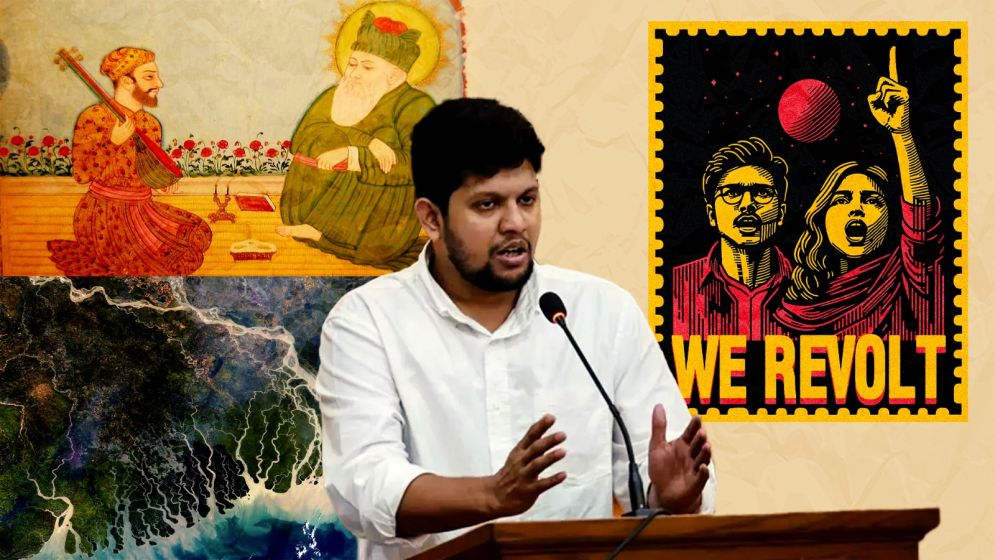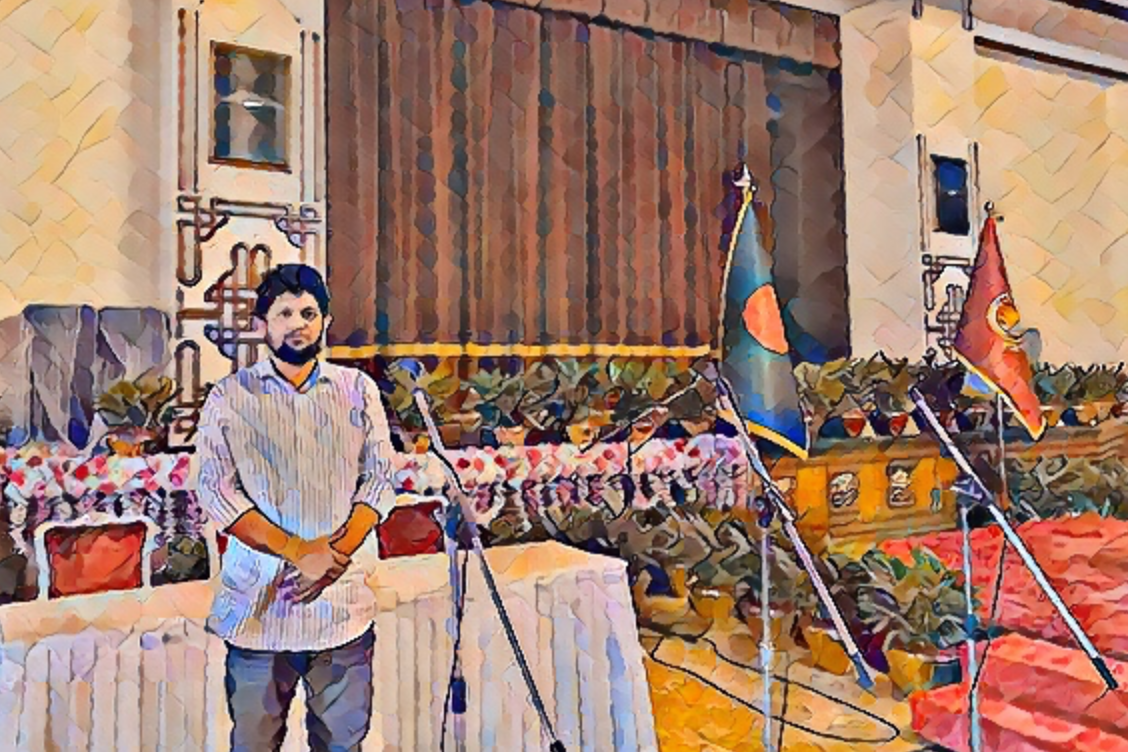Shapla, Shahbagh, and Jamaat: Advisor Mahfuj's post unravels a complex legacy

Advisor Mahfuj Alam, who recently assumed the portfolio of the Information Ministry, has been a political punching bag for a significant portion of the population, particularly since the Long July uprising.
Much of the backlash against Advisor Mahfuj stems from his perceived role as the “mastermind” behind the uprising, a claim he personally denies, as the uprising was the result of efforts from various stakeholders.
Despite this, his appointment to the Chief Advisor's office without a clear portfolio, coupled with his seemingly mystic and “theoretical” rhetoric, has created an image of him as a “powerful behind-the-scenes figure,” even though this perception may be misguided.
Additionally, the “growing dissatisfaction” among some sections of the population due to the “deteriorating law and order situation,” which was amplified by social media, led people to seek a target from the interim government to blame, and Advisor Mahfuj became an obvious yet somewhat unexplained choice for this.
Since taking on the Information portfolio and the formation of the student-based political party, the National Citizen Party (NCP), Mahfuj, who previously posted rarely on his Facebook, has noticeably increased his public posts.
It’s important to clarify, however, that Mahfuj is not part of the new political party in any official capacity.
In one of his recent posts, Mahfuj shed important light on the dichotomy between Shahbagh and Shapla, as well as the question of Jamaat-e-Islami’s legacy.
This poignant post is translated here for the readers of Bangla Outlook (English).
—
Jamaat-e-Islami was complicit in war crimes. However, as Nahid Islam pointed out, they have atoned for their [past] actions through this uprising.
I too have stated that those in Jamaat who align with Bangladesh’s interests have every right to participate in politics here.
With only a few exceptions among the new generation of Jamaat, none are pro-Pakistan. Therefore, the political rights of Jamaat and Chhatra Shibir cannot be stripped away by branding them as anti-independence.
Our battle must be won through political and ideological struggle, confronting their propaganda with the truth.
A significant portion of those who joined Shahbagh fell prey to a misguided sense of 'consciousness.'
Many students and young people weren’t there due to Islamophobia, but simply to demand justice for war criminals.
The Awami League and left-wing Mujibists manipulated the emotional fervor of the youth to push their agenda for democracy, which culminated in a decade-long fascist regime marked by the disappearance, murder, rape, and oppression of opposition members.
However, many of the students and youth who once stood at Shahbagh have since recognized their errors and sought to move beyond the Mujibist narrative.
Over the past few years, they have actively fought against fascism—many have been injured or even killed in the process. These individuals are now our comrades. They played a pivotal role in this uprising, securing the defeat of the League and Mujibism.
They have already paid for their political misjudgments.
I personally went to Shapla Chattar during the long march out of my love for the Prophet Muhammad (PBUH). I could not attend on May 5th though.
However, our interest was never in the trial of war criminals or the involvement of Jamaat leaders. Our sole purpose in coming to Dhaka was to honor and express our love for the Prophet.
I studied in a madrasa that followed the Sharsheena path, where Jamaat leaders were considered to hold misguided beliefs.
The execution of Jamaat leaders was seen as a consequence of their opposition to scholars and true 'Islam.' From childhood, we have known Jamaat as being anti-scholar and anti-religion.
What many may not realize is that most of the Shapla activists are actually opposed to Jamaat's ideology and leadership. Many of Shapla’s leaders have been victims of Jamaat’s hostility toward scholars and the Pir-path.
In fact, many have suffered oppression and torture at the hands of Jamaat and Chhatra Shibir leaders. Yet, Jamaat has effectively used them as proxies, just as the League used the 'Shahbaghis.'

We are now in a post-uprising era. We reject the narrative that brands Jamaat or Chhatra Shibir activists as 'Razakars' or 'anti-independence' and seeks to eliminate them.
Similarly, we stand firmly against the Islamophobia that emerged from Shahbagh. I, too, have been a victim of this Islamophobia.
From being labeled a jihadist simply for wearing a Punjabi cap, to the systematic marginalization of madrasa students and scholars, Shahbagh is responsible for this demonization.
The cultural framework of Shahbagh reduced opposition party activists, including those from BNP and Jamaat, to subhuman figures.
The post-uprising period has now opened the door for dialogue. Moving beyond the binary of Shapla and Shahbagh, there is an opportunity for activists from both sides to unite as 'comrades' against the core forces of Shahbagh—Mujibism, pro-India sentiment, and the Sheikh family.
In fact, it was the solidarity between Shapla and Shahbagh activists that ultimately led to the downfall of Sheikh Hasina.
Furthermore, for Shapla’s leadership, this has been a chance to assert respect and a partnership with the state, without becoming anyone's tool.
In my previous two [facebook] posts, I expressed my gratitude to the scholars (Ulama) for their crucial role.
I trust that the leadership of the Tawhidist masses will remain in the hands of mainstream, pro-right scholars, rather than falling into the hands of fringe elements.
I hope the mainstream scholars will stand firmly against Shahbagh's mob rule and culture of impunity, advocating for the people and the country, and not replicating that same culture.
In this struggle, we will side with the oppressed and the democratic mainstream scholars.
The current interim government has taken steps to pursue justice for the Shapla massacre. The Honorable Chief Adviser has spoken of documenting the events of the massacre.
I sincerely hope that a thorough investigation, documentation, and justice will be ensured for the brutal killings carried out by the tyrannical Sheikh Hasina against the martyred madrasa students and scholars at Shapla.
Former 'Shahbaghis' who have expressed their rightful stance through the uprising and fought for it cannot be erased or eliminated in any way.
Labeling someone as a 'Shahbaghi' and undermining the potential for broader unity in the post-uprising era is unacceptable.
If anyone from Shapla's side believes they will succeed by turning former 'Shahbaghis,' who oppose the League and support the uprising, into enemies to be eradicated, they will fail.
If you demand mob rule and impunity for Shapla, you will end up being labeled a 'Shahbaghi' too, won’t you?
Those on the left who oppose Mujibism have long been outspoken against the Shapla massacre. Therefore, it is crucial for us to clearly distinguish between friends and foes.
On the other hand, the old 'Shahbaghis' who still consider their allegiance to the core of Shahbagh—Mujibism, pro-India sentiment, and the Sheikh family—as their ideology must not be shown any leniency.
These are the ones who incited abductions and massacres, and created justifications for them. During the July massacre, they remained silent, and some were actively involved in legitimizing it.
Even now, those abroad defending fascism—many of whom are Shahbagh fascists—remain enemies of the people, enemies of justice, and enemies of democracy. Their trial has begun, and it will proceed to its conclusion.
In the post-uprising period in Bangladesh, the culture of mob rule and impunity that took root in Shahbagh must be rejected by all sides.
We must collectively move towards democracy, uphold the rule of law, and foster respectful dialogue and solidarity among citizens.
The students and youth of Shahbagh who fought against Mujibism and fascism should not be provoked or divided by labeling them as 'Shahbaghis.'
Such actions will harm everyone. The political vendetta of branding anyone as a 'Shahbaghi' must come to an end.
While ideological and cultural struggles are inevitable among the forces of the mass uprising, we must honor the memory of the martyrs, strengthen mutual understanding and friendship, reduce our enemies, and ensure the long-term defeat of those we have identified as enemies.
—

